"We heard an air-raid siren, planes and bangs...the war has indeed started": the scariest day of February 2022 through children’s eyes
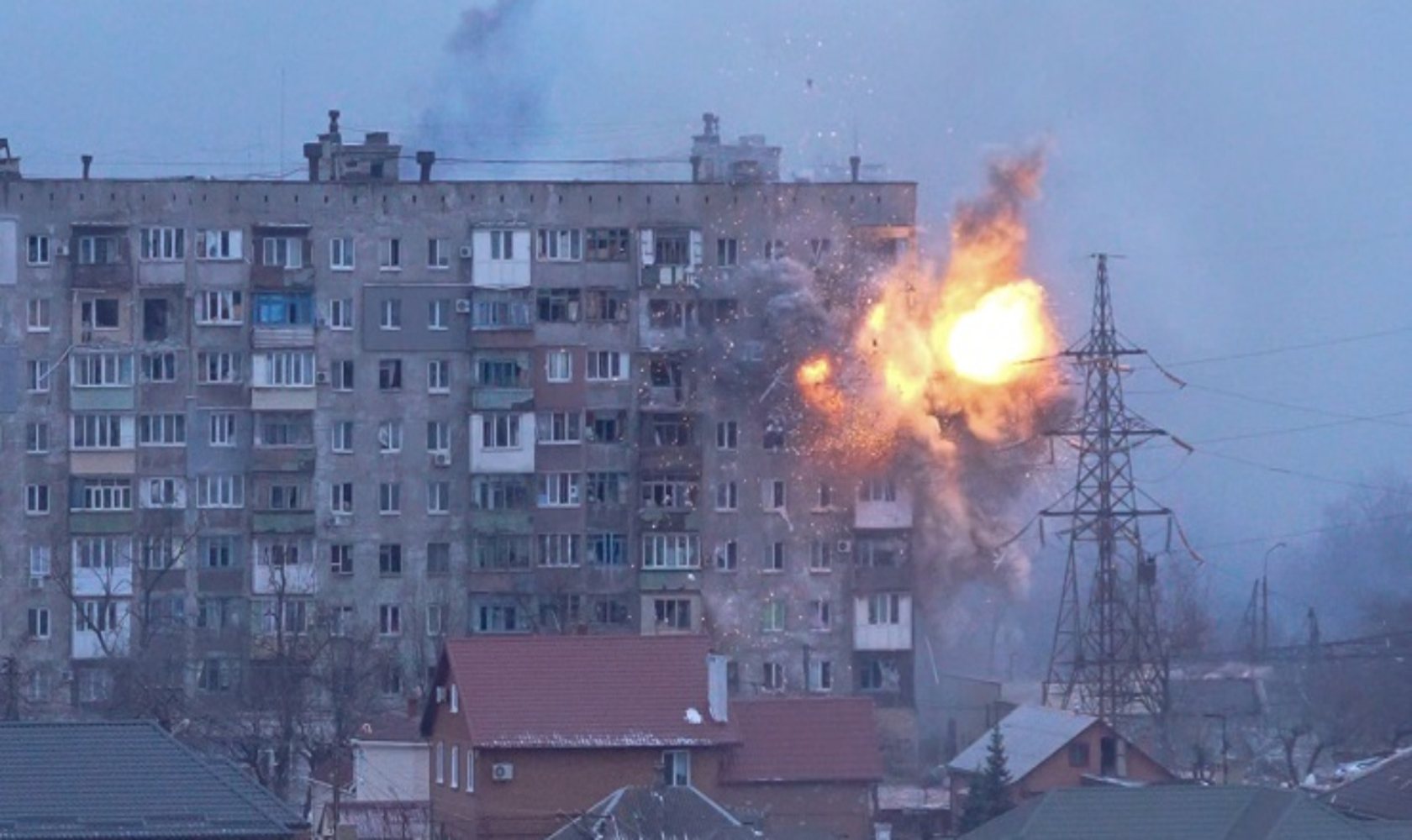
24 February 2023 marks the anniversary of the most horrific day when Russia launched a full-scale invasion on Ukraine.
The war deprived many Ukrainian children of their homes, toys, schools, health and harmony. Russian occupiers took the lives of hundreds of children.
On 24 February 2022, adults took on the tasks of standing up for Ukraine’s defence, relocating their children, volunteering and thinking about what to do next. But the children's lives were full of the unknown - all that remained was to believe in their parents and Ukraine’s defence forces.
How did children and teenagers see the first day of the full-scale war?
With their parents present, we talked to children about what 24 February was to them, how they experienced it and what are their dreams.
What follows is their stories.
Yehor, nine years old
Mariupol
"I heard Explosions – very strong and loud. I was very scared – I realised that the war had started"
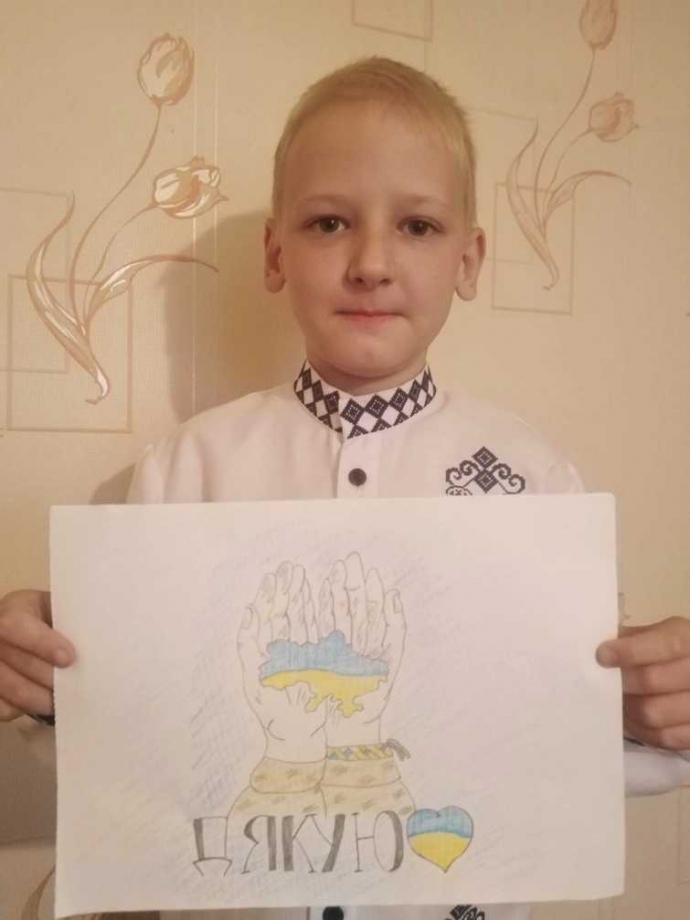
Nine-year-old Yehor from Mariupol is currently living in Ivano-Frankivsk Oblast. He is repeating year 3 at school and likes to play football. But Yehor does not really enjoy the small-town life - he misses Mariupol.
After the start of the full-scale war, the then eight-year-old boy remained in Mariupol for over three months.
"Mariupol is a very big, bright and cool city. And the sea [of Azov] is so small and that's why it's warm. I love Mariupol because I was born there, it was my home, I went to school and kindergarten there.
The city was so beautiful, I used to like going on the swing there and swimming in the Sea of Azov," the boy recalls.
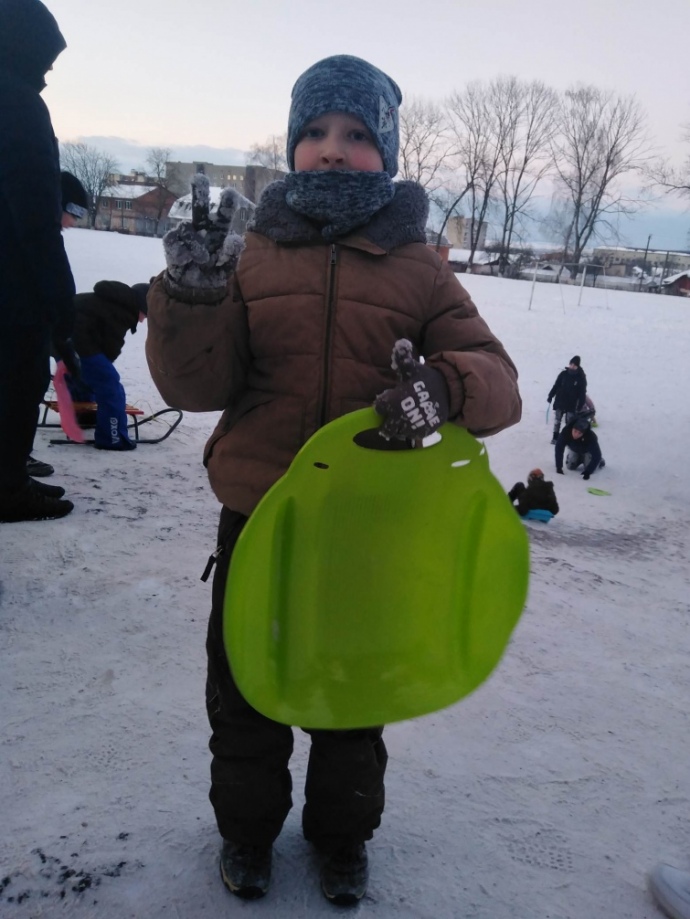
On 24 February 2022, Yehor was supposed to live through an ordinary day: go to school, play games. The boy remembers his mother telling him that the war had started, and he did not believe it at first.
"I thought mum was joking, I was half awake and didn't understand anything. We heard an air-raid siren, planes and bangs. We were hiding in the house itself, we don't have a bomb shelter, so we didn't run to shelter.
Explosions were ringing out in Mariupol - very strong and loud. At first, I had thought those were the sounds of planes, but later I heard how a real plane bangs – now that’s a real terror...
I was very scared - I realised that the war had indeed started," Yehor shares.
There were three houses around a large yard: Yehor lived in one of them with his 15-year-old sister and mother, his grandparents lived in the next one, and his great-grandmother lived in the last one.
Yehor and his family were sheltering in the corridor, complying with the two-walls rule [safety rule whereby a person keeps two walls without windows between them and the street during attacks – ed.]
"We were eating our usual meals, at the time when we still had food, not buckwheat with canned meat. My sister and I slept on a bunk bed, and later mum joined us, because our room was more sheltered.
When the first heavy shelling happened, the whole family hid behind the wardrobe. It was bang-boom-bang-boom-bang-boom, and over again after a few minutes, and this repeated five times a day," Yehor says.
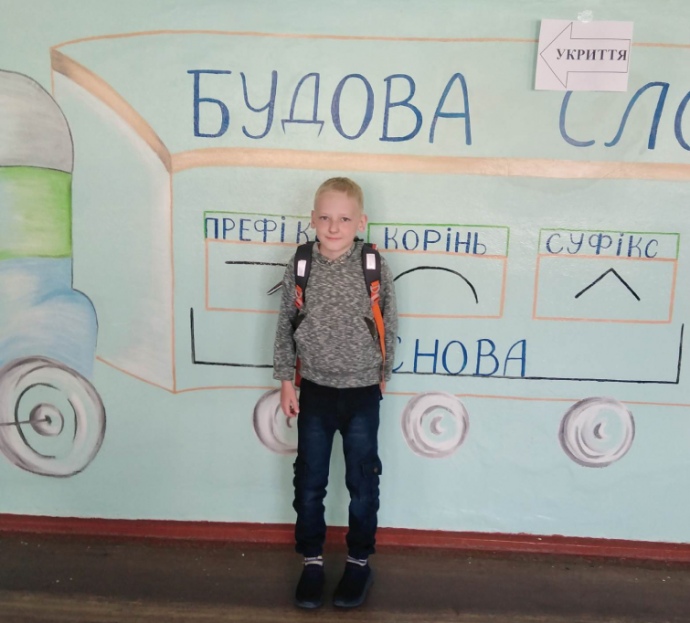
The boy remembers the sounds of mortar shelling, tank attacks, Russian warplanes and machine gun rounds.
"When mum, my sister and I were sitting on the sofa, everyone was playing games, only mum was not playing and was watching something. And then the street combat began – we heard the shots close by, and you could tell those were machine guns, not tanks. We hid and turned off the lights – I remember this well," Yehor says.
Yehor was wounded during one of the Russian mortar attacks on 18 March. He remembers this day:
"We were sheltering at my grandmother's house. I took my Lego along and then there was another bombardment. Mum called me to come over to the corridor, but I wanted to play some more so I went: ‘In a moment’. I was already used to this – there were bombardments every day.
I would have been better off not running to that corridor. Because when we were sheltering in it, my granddad was holding the front door which had fallen off its hinges. And granddad told us ‘Take shelter, run to the bathroom’."
At that moment, a mortar bomb flew in. Yehor's grandfather was killed. His mother received shrapnel wounds to her leg and arm, his sister to the head, and the boy himself to the back.
A neighbour gave the family first aid, brought bandages and peroxide. Ehor’s mother Olena moved with the children to her aunt and uncle Yevhen, who took them in.
"I was screaming because I was in pain and cold, my clothes were all torn. The neighbour gave me some juice and I was like 'okay'. And after I drank the juice, I was like 'ouuuuch' all over again," Yehor recalls.
"People who lived in the apartment block called us 'children of the dungeon"
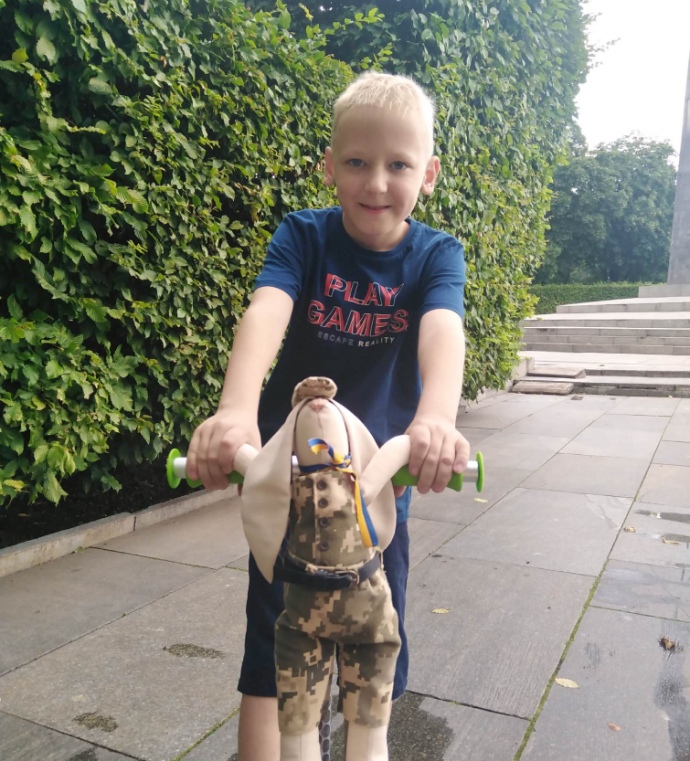
A few days later, the family had to move to the basement of someone else's apartment block. For the first half hour, Yehor and his family were standing right in the entrance way, then they were sitting on chairs for a long time until a place was found for them.
"We just sat there. We had nothing to eat, so we took two thermoses of water with us. My uncle found some butter and nuts, which we ate for two days. At first, I just gobbled up the nuts, then the butter. My mum used not to like butter at all, but then she grew to love it. We were covered in dust all over. The residents of the building called us ‘dungeon children’," the boy continues his story.
Once, Uncle Yevhen had to put out a fire because smoke had spread through the pipes after it hit another apartment block.
"At that point I was thinking that we would have to leave everything behind and go to another basement where there would be nothing – no water, no butter. Then my uncle found some salted meat, but it had had better days. I was really hungry," Yehor recalls.
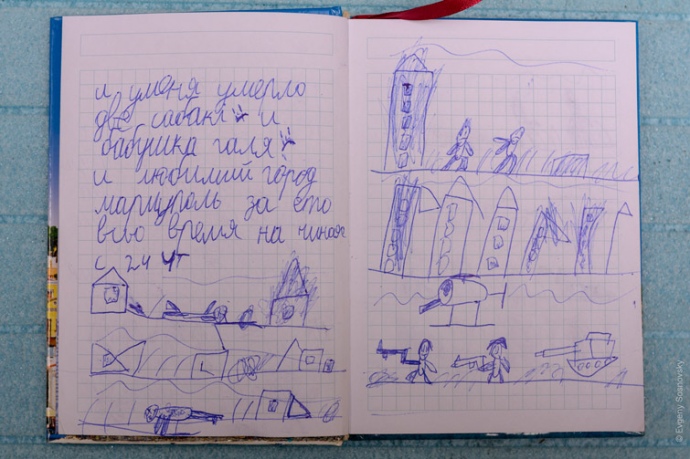
At that time, water supplies were running low, Mariupol residents were draining water from radiators. Yehor's family was looking for abandoned water; and sometimes the residents of the building, where they sheltered in the basement, helped them.
"We had a legendary moment when people gave us all kinds of sweets, lollies and M&Ms. And there was a funny old man in the apartment block who was always joking," the child recalls with a smile.
Yehor and his family spent two weeks in the basement. When he returned home, he started keeping a diary.
"I was bored and had nothing to do. I decided to write. My uncle brought books, some board games and this notebook with pens. I started to write about what was happening there in Mariupol and made drawings," the boy says.
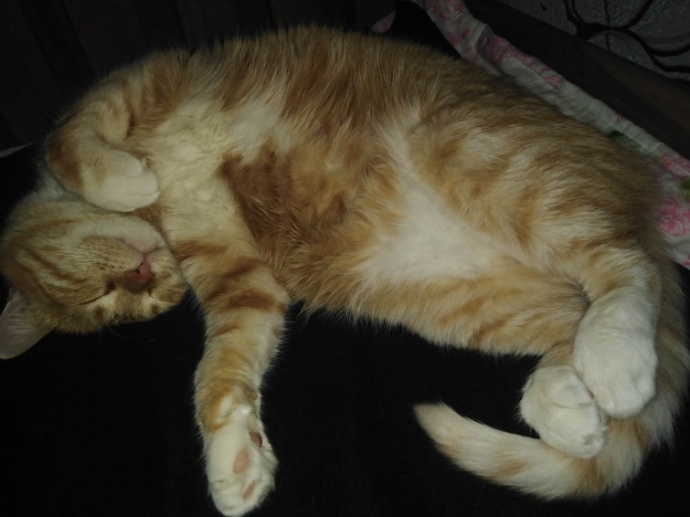
In his hometown, Yehor had some beloved four-legged friends: a big ginger cat named Kuzia, whom they managed to rescue, and two local stray dogs – dogs that ‘belonged’ to this apartment block – who were killed.
"Once my grandmother was hungry, so she made some porridge and gave it to my great-grandmother. Grandpa had already died then – he simply bled to death.
Kuzia [the cat] came and my grandmother gave him everything. She didn't eat at all then – she just didn't want to. But I ate like I’ve never seen food before," says Yehor.
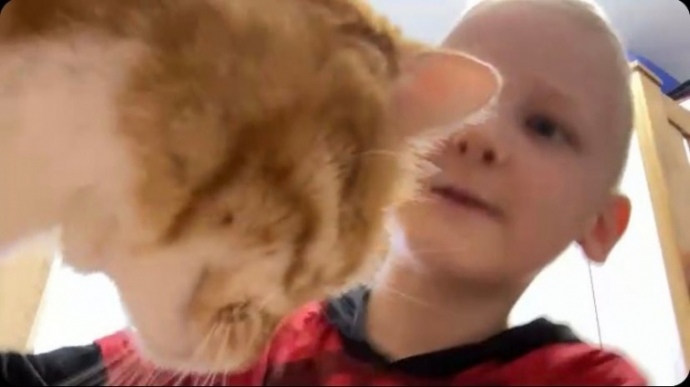
Yehor's family started evacuating when the Ukrainian military withdrew from Azovstal steelworks [the last stronghold of Ukrainian forces in the city – ed.].
Yehor, his mother, grandmother and sister left on 31 May when Russian occupiers let them through after the filtration process.
"My mum forgot some paperwork, and I was like, 'Well, there you go, yeah'. I got really worried, I almost started shaking, it was very scary.
They told me to turn sideways, left, right, like in prison. The Russians didn't ask me much - they questioned my sister more. Then my mum came," the boy recalls.
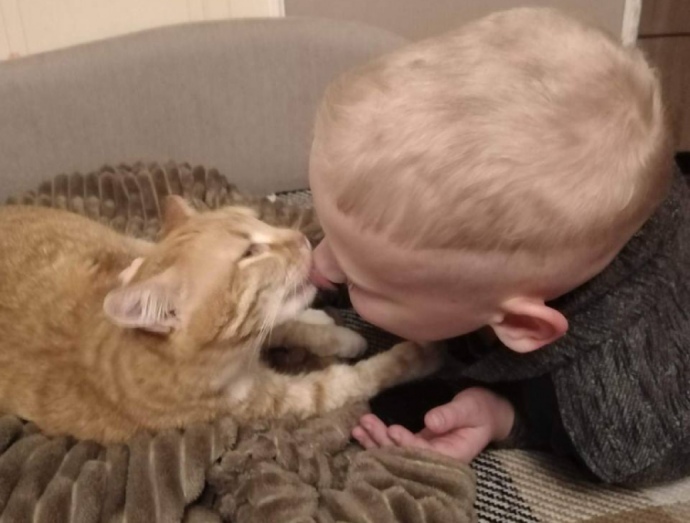
Little Yehor, his mother, sister, grandmother, great-grandmother, mother's uncle and aunt, and their cat Kuzia made it out of Mariupol.
Yehor's great-grandmother survived two rocket strikes and is now in Kyiv. She turned 91 on 22 February.
Yegor's home in Mariupol is still standing, but it is damaged, and only a few bricks remain of his great-grandmother's home. He has no more relatives in the devastated city.
"It's better at home. I wanted to stay in Mariupol. I would have even cleaned up these overgrown weeds myself. I dream of at least finding a second home... And returning to Mariupol," Yehor says.
"To Ukrainian Mariupol," his mother adds.
Stepan, 13 years old
Kyiv
"I did not want to have memories of 24 February – I just had to pack my things."
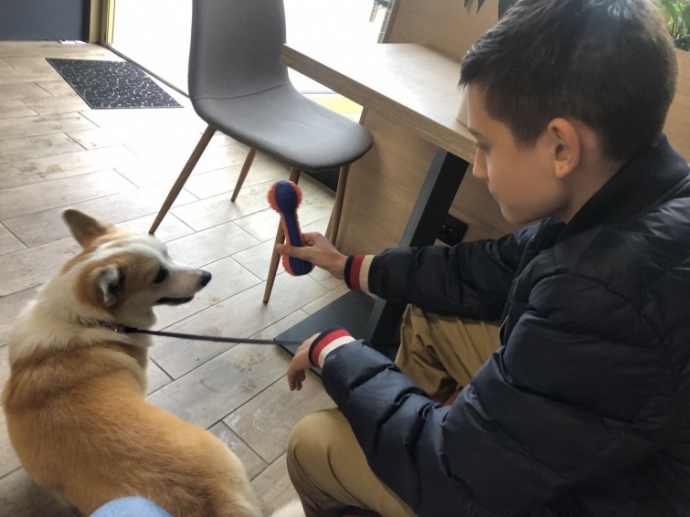
Stepan from Kyiv is 13 years old. He is in year 7, he loves his dog Charlie and enjoys history books.
This is how the teenager recalls the beginning of the full-scale war:
"On 24 February, I woke up at about 4 a.m, and a few seconds later I heard a sound like rubbish bins being taken out. But we often have rubbish bins taken out, so I didn't make anything of it.
Then my mum came in and said we were leaving. I looked at my phone and saw that the Russians were already bombing. We packed our things and drove to a village in Kyiv Oblast with our dog."
Stepan says that he did not want to have memories of that day, he just had to pack his things.
"I didn't hear air-raid sirens because we didn't have any in our neighbourhood. My relatives wanted to keep us all safe, everyone was thinking about what to do. And my dog was in the best situation because he did not understand anything, he was just happy and licked everyone," Stepan recalls.
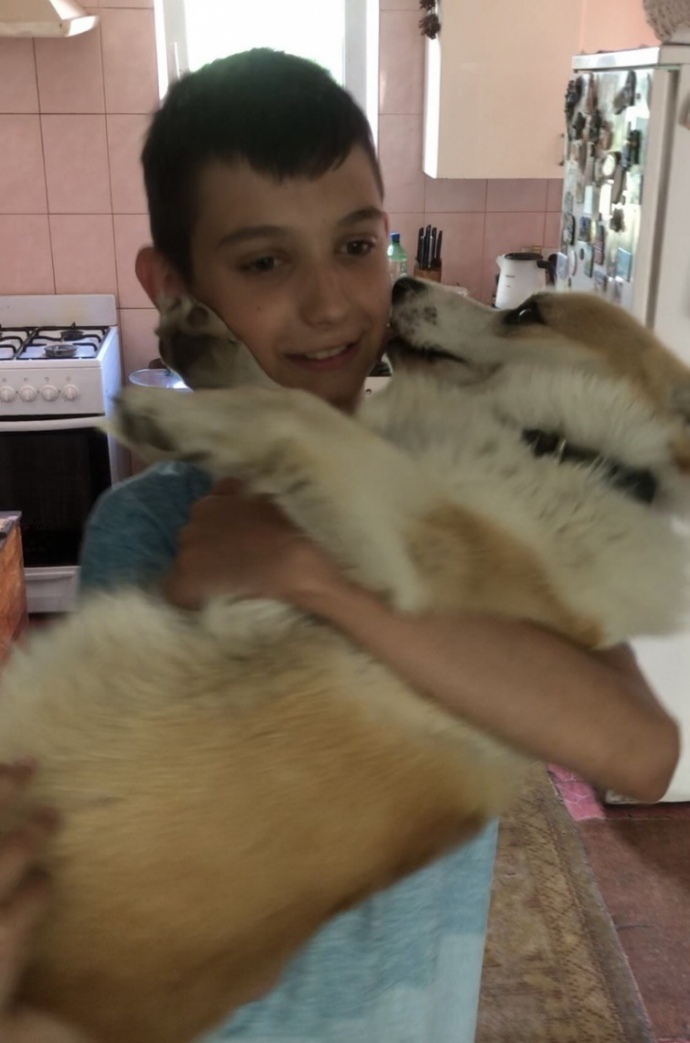
The boy did not believe that there would be a "big" war [as opposed to hostilities ongoing in the east of Ukraine since 2014 – ed.], but it did not come as a surprise to him.
"Of course, I was scared. But I knew that sooner or later it would happen, because at that time the war in Donbas was still going on. My uncle served in the ATO and also went to the front on 24 February, so I knew about it," the teenager says. [The ATO or Anti-Terrorist Operation is a term used from 2014 to 2018 by the media, the government of Ukraine and the OSCE to identify combat actions in parts of Donetsk and Luhansk oblasts against Russian military forces and pro-Russian separatists – ed.]
Stepan's uncle Yaroslav was killed during the battle for Sievierodonetsk on the night of 6-7 June.
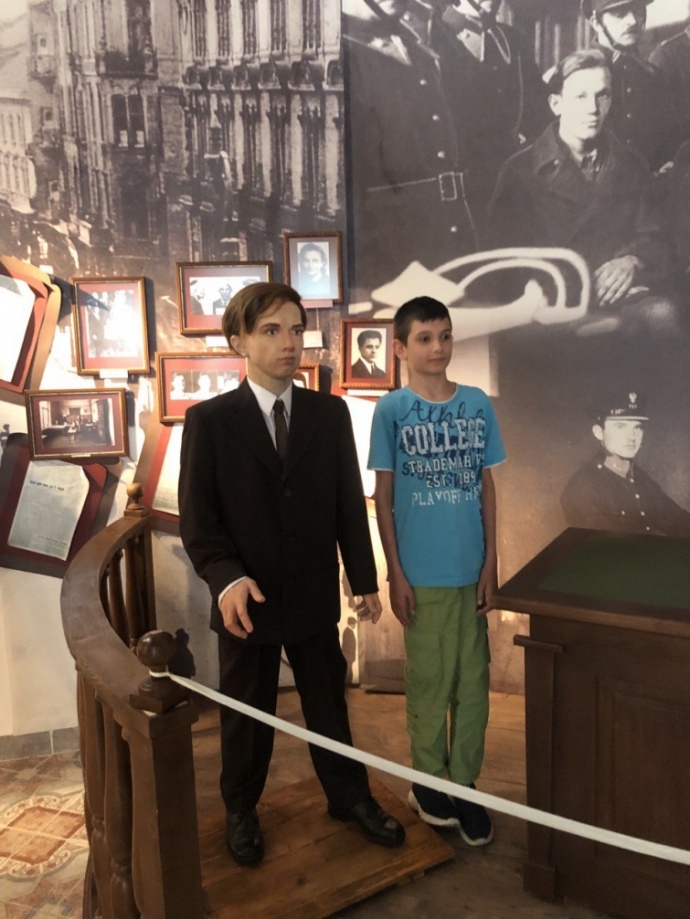
"I thought we would stay in the village for about a week. That the Russians would be fighting in the Kherson or Donbas areas, but I didn't think that they would attack Kyiv.
It was unpleasant that we were leaving not just because of some small danger, but in order not to trade places with those people who were killed," he adds.
A few days later, Stepan, his mother and sister fled to the Lviv region to live with relatives.
"In Lviv, we were a whole horde: me, my mum, sister and our friends. We were sitting around like displaced persons and did not do much so as not to be a nuisance. When a rocket struck not far from us, I was a little scared.
I really wanted to go back to the capital as soon as possible. I missed my dad, who stayed in Kyiv Oblast, and I missed the city itself.
I was bored because I had no one to talk to. Everyone was either younger or older than me, while half of my classmates fled abroad," Stepan recalls.
"I am a patriot. I would join Ukraine’s Armed Forces if I had the opportunity."
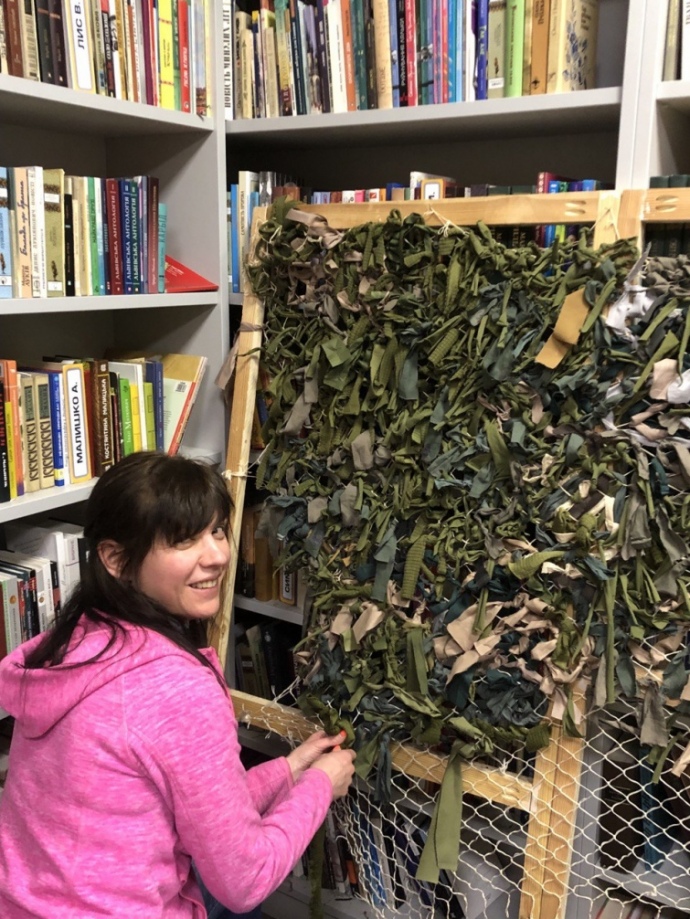
Stepan's mother wove camouflage nets, and the teenager also tried to help the military.
"I am a patriot. I would like to join Ukraine’s Armed Forces if I had the opportunity. I understand that if I were defending Ukraine, even if I died, I would actually die instead of 5 or 10 civilians," Stepan says.
Of course, the teenager does not have the opportunity to join the army, but after his birthday he donated 1,000 hryvnias (approx. US$27) of his birthday money towards buying tanks.
Stepan believes that after the full-scale invasion he grew up faster and became more independent.
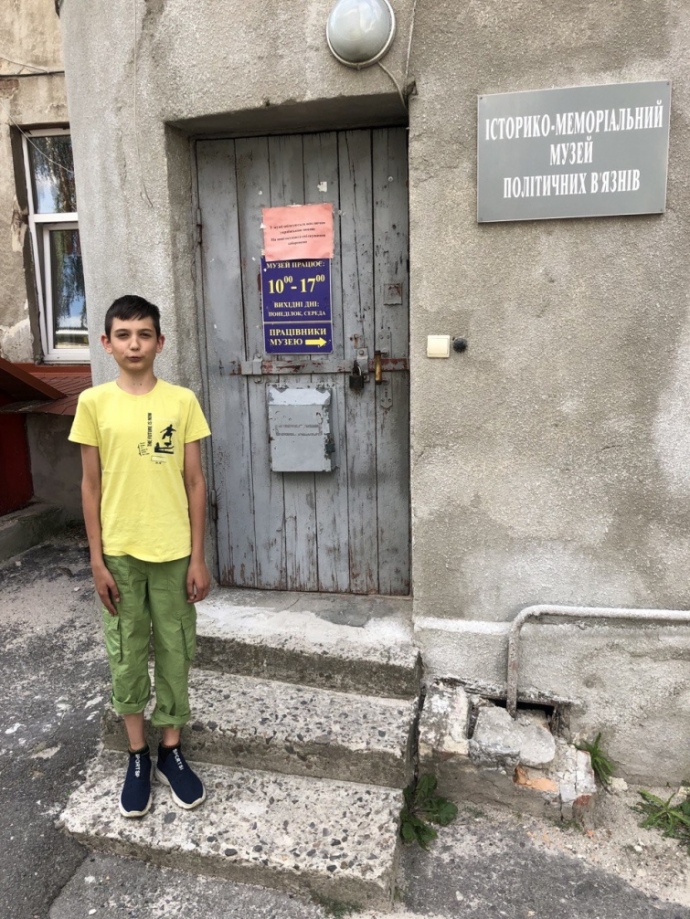
"Probably following 24 February, I comprehended my patriotic stand. I always knew that I was a Ukrainian, but then I comprehended that I truly was a Ukrainian. I started thinking more about my country and about history.
I was always wary of the Russians, but maybe until June or July I thought there were some normal people among them. Until the summer, I had not been very mindful about what [content] I had been consuming, and I had watched [content by the] Russians who were silencing the information about the war.
Now I'm more interested in historic content. I used to be more interested in the Second World War, and now I'm more interested in the First World War," the teenager says.
Stepan shared his dream with us.
"As for Ukraine, my dream is to achieve a long-lasting victory in the war, and to reinstate its internationally recognised borders. Then it will be easier to develop Ukraine, and the economy will be better. And if there is any war in the future, it may not be as severe as it is now. Apart from that, I have no more dreams. I don't dream much - I try to act," the boy says.
Anhelina, 14 years old
Kyiv
"Everything seemed like a movie, where I was just watching from the sidelines"
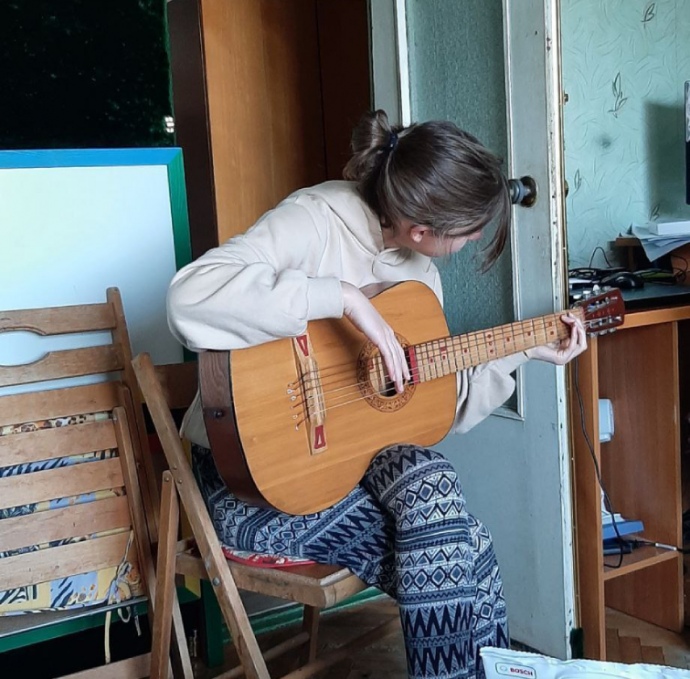
14-year-old Anhelina from Kyiv is in year 9 at a distance-learning school. The girl has many hobbies: dancing, learning languages, photography, reading, singing and acting, and she also wants to learn to play the piano and guitar.
24 February is Anhelina's birthday, so a year ago she was going to celebrate her 13th birthday. But the war interrupted these plans.
"On 24 February 2022, at about six in the morning, my dad woke me up and told me to pack my things because the war had started. Immediately after that, we heard several dull explosions.
I was confused, but I didn't feel much fear or surprise. Everything seemed like a movie where I was just watching from the side-lines.
It was as if my sense of time was instantly erased, and at first I did not remember it was my birthday and my plans for it," Anhelina recalls the beginning of the full-scale invasion.
On that day, the girl and her family were supposed to get together to celebrate her birthday at her relatives' house. Instead, they had to quickly flee for a village near Kyiv.
"I felt quite calm and tried not to worry, because there had been a lot of talk about the possible outbreak of a full-scale war before.
I thought: ‘This doesn't depend on me, I can't stop the war. Whatever will be, will be, so what's the use of fear and worrying in advance?’," Anhelina recalls.
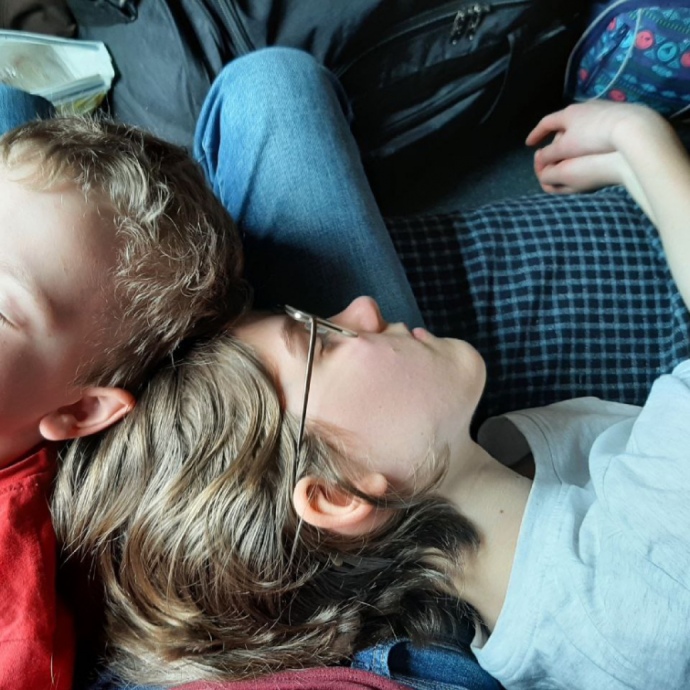
About a week later, the Russian army began to move closer to the village. Anhelina, her mother, and brother gathered their belongings, which they had packed from Kyiv and which were only meant to be enough for a few days, and left for Lviv by evacuation train.
"A few weeks later, an opportunity came to spend some time in Poland, so my mum, brother and I took a bus across the border, leaving my dad and the dog at home," she says.
The family lived in Poland for about two months, and Anhelina and her brother studied at a local school.
"It was quite funny when I tried to communicate with my classmates and teachers using a mixture of four languages: Ukrainian, English, Polish and Russian," Anhelina recalls. "I was impressed by the support from Polish people and Ukrainian flags flying on the streets."
To keep herself on an even keel, the girl was trying to do something to distract her brain or body: to focus on the good and believe that things would get better soon.
"Maths helps me to keep myself in check (it quickly takes all the anger away), as well as dancing, sports, and trying to learn Korean grammar," she says.
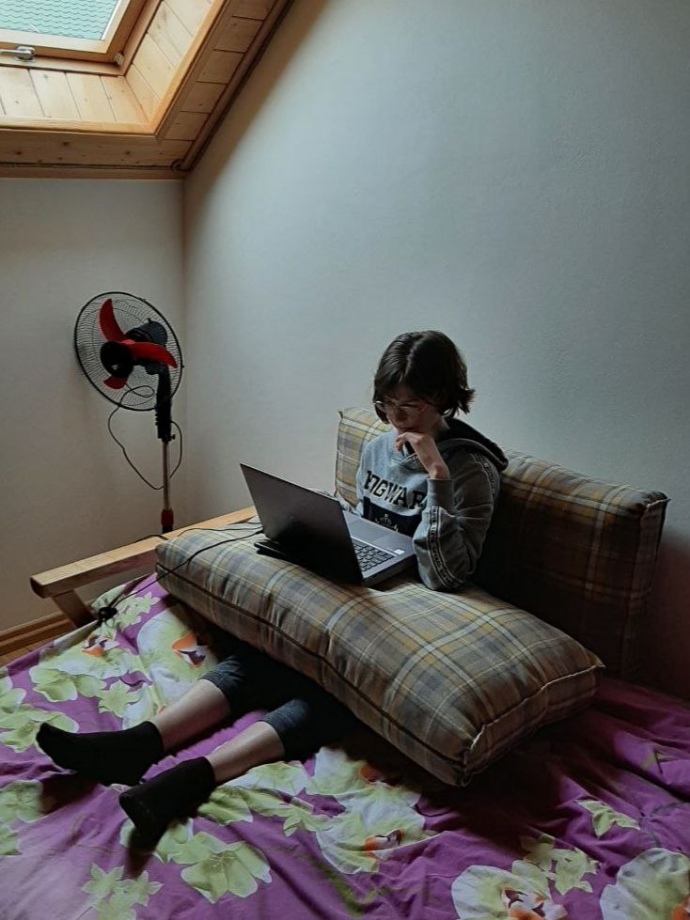
In mid-May, Anhelina, her mother and brother returned home and seemed to have become used to the air raids. One day, while having a walk, Anhelina coined the term "sirenade", lyrical songs sung while an air-raid siren is sounding.
Six months later, the bombardments of Kyiv intensified, and electricity, internet, and water were cut off. Anhelina and her family heard explosions more and more often, so in November they fled to Poland once more, and they have been staying there since.
"During this time, I realised that the world is probably better than I saw it before the full-scale invasion, and there are many good people around. Different countries support us and try to help us, and I am very grateful to them for that," Anhelina ads.
On the day of this interview - on the anniversary of the full-scale war – Angelina turned 14 years old.
"I really want to return to Kyiv, we plan to do so in the coming days. To be honest, I don't know when and how I will celebrate my birthday (or rather, two birthdays at once: for the previous year and this year).
The date is not important to me. The main thing is to be at home with my loved ones," the girl says.
Danylo, seven years old
Chernihiv
"I remember watching TV and seeing war"
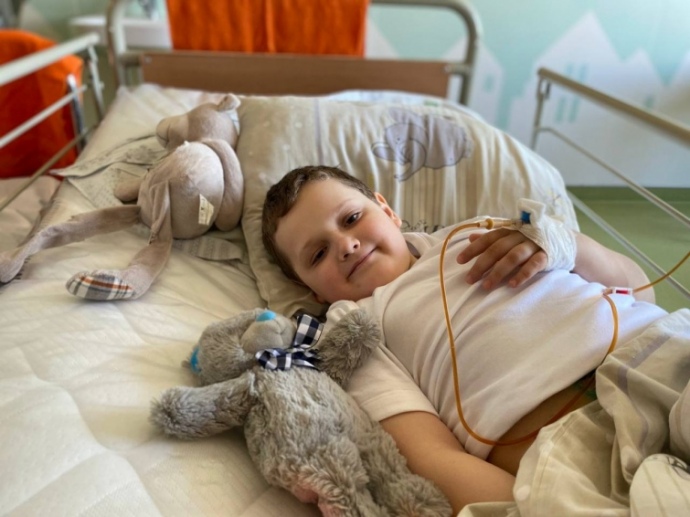
Seven-year-old Dania [short for Danylo] lives in Chernihiv. At the beginning of the war, he was in year 1, and now he is in year 2.
Dania has only a few memories of the beginning of the full-scale invasion:
"I remember watching TV and seeing war," he says.
On 23 February, Dania learned a tongue twister, did his homework, and his mother packed him a lunchbox for school.
"On the 24th, my husband and I got up for work at 5 a.m. I made breakfast. At 6:50, my mother, who lives in Hlukhiv near the borders with Kursk and Bryansk oblasts [of Russia], called me and said through tears, ‘Tanks are coming’," Natalia, Dania's mother, says.
At first, Dania did not hear the explosions and was quite calm. He did not go to school that day, and his parents did not go to work. In the evening, the bombardment of the city began.
"At home, I was playing on a phone. I wasn't worried, I wasn't scared - only my mum was," Dania says.
In the early days, the boy was woken up to go down to the basement during air raids, but later the family and their neighbours just started going out into the hallway.
"It was boring in the basement. But I was not sad, I played tanks. It was good when we could get out for a walk," Dania says.
When the Russians were trying to break through to Kyiv, the family heard sounds of an enemy plane every day at the same time: around midnight and at half past five, it would arrive, drop a bomb, and fly back.
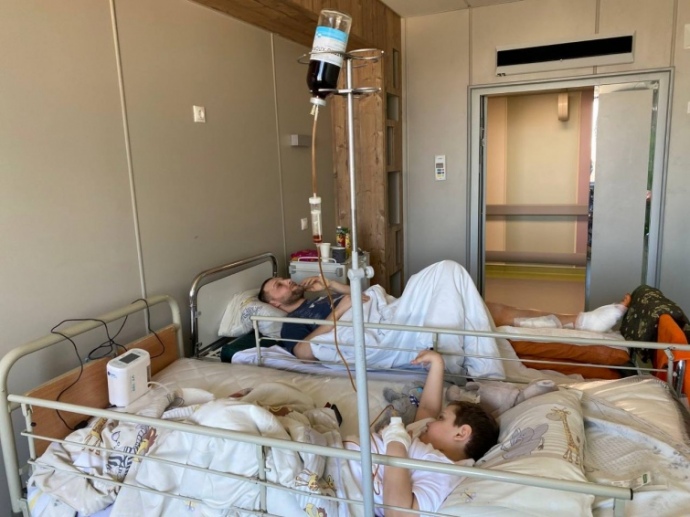
By early March, Dania's house had lost heating, electricity and hot-water supply, and a while later cold-water supply too. The school he used to attend was already destroyed.
The neighbours fled, while Dania's family stayed in Chernihiv. They would go to the city centre to charge their phones.
The TV was not working because of the power outage. Dania loves toy cars, so he played with them in the dark.
"In the first weeks I did not go out for a walk. When we went to the centre to charge our phones, there was no electricity. It was boring. I also made friends with a boy, and we played with cars together," Dania says.
To get in a queue at the grocery store for food, they had to get up at 6 a.m. Dania's mum and dad would take turns to do grocery shopping. There was a long queue in the store, so most of the food was sold out quickly.
"An auntie purchased the last of the sausages, which I love," Dania adds.
Food and water supplies were starting to run low. On 17 March, when his father went to fetch water, Dania's family came under fire.
The child had an injured leg, shrapnel in his back and an abdominal wound. The boy had to have 60 centimetres of his intestines removed.
"A chunk of my flesh was torn off," the boy says, recalling the wound.
He spent 16 days in the Chernihiv children's hospital alone. On 3 April, volunteers transferred Dania and his parents to Okhmatdyt, the largest specialised children's hospital in Ukraine, where they stayed for over three months.
"When we came under fire, Dania knew who came for us, that it was the Russians who were shooting and killing. He would say: ‘I hope Putin dies’," his mother recalls.
Before the New Year, Dania and his dad underwent rehabilitation at Okhmatdyt, and his mother underwent her ninth orthopaedic surgery. In March, the boy will have to go to hospital again.
"A few days ago, Dania told me that he wants a stable life – the life that he had before the war," Natalia says. Dania also told us that he dreams of a remote-control plane.
Mykhailo, nine years old
Kyiv
"When it all started, I was a little bit in a state of panic"
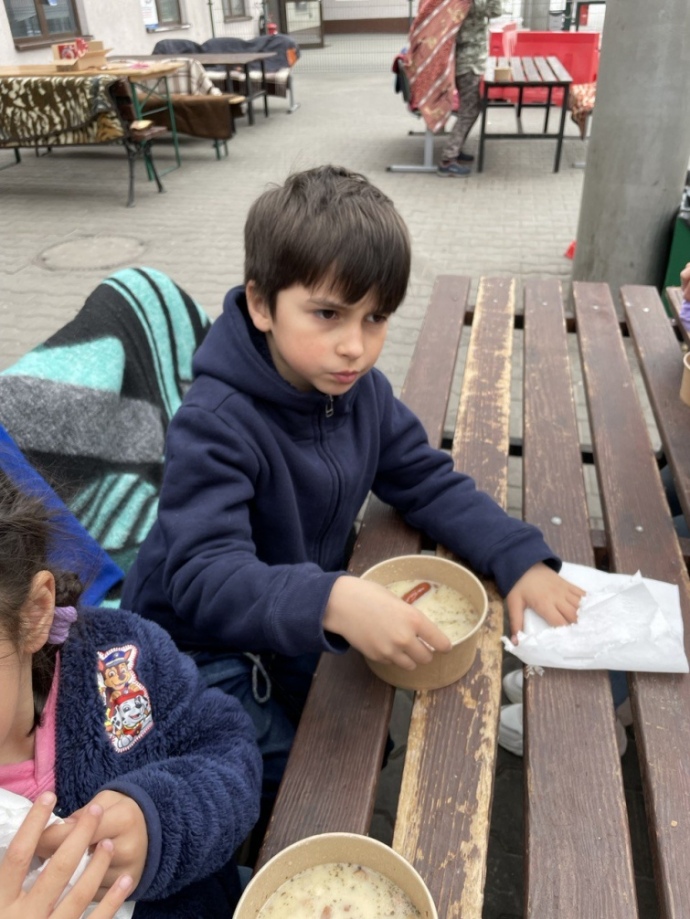
Nine-year-old Mykhailo is a resident of Kyiv, but he temporarily lives in the city of Chernivtsi.
The day of 24 February began for Mykhailo in the same way as for many other children.
"I remember being woken up early and told that there would be no school. My mum told me that the war has started. At school, we were told about war, but they reassured us that it wouldn't happen, although they told us about some nuclear bombs," Mykhailo recalls.
The boy and his family went to a bomb shelter, where he stayed for a long time and met his classmate.
"When it all started, I was a little bit in a state of panic. To calm down, I read a book about the Christmas pig. I like it, and it was the first book I remembered to take along. In it, a boy lost his toy, and he finds himself in the land of lost things, where all the adventures unfold," Mykhailo adds.
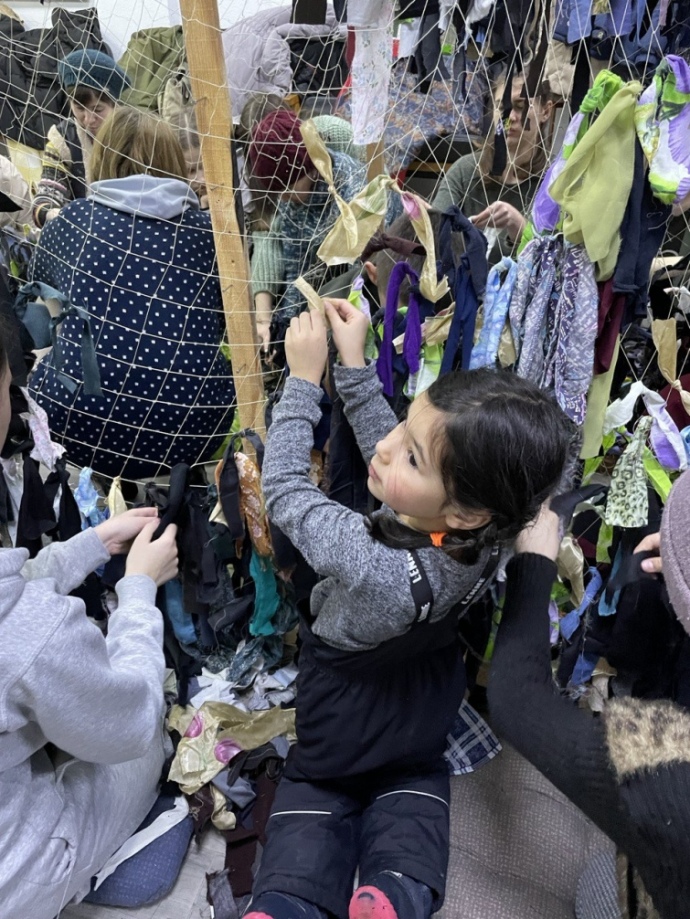
On the evening of 24 February, Mykhailo's family fled Kyiv. First, Mykhailo went to the town of Ostrih with his mum, dad and five-year-old sister, and then to the city of Chortkiv to stay with friends.
Mykhailo's father stayed with him for a bit in Chortkiv, and on 16 March he joined the army and next time he saw his son was in summer.
"My dad drove us to Chortkiv. We stayed there for a month, and it was great. Then we went to Poland by bus and to Cyprus by plane. We stayed there for about three months, flew back, took a bus, and came here to Chernivtsi.
I had moved from one flat to another in the past, but never on such a scale. The most unpleasant thing about moving is that it can take a long time. Firstly, it's boring, and secondly, it's scary. It's difficult to sit still," Mykhailo recalls.
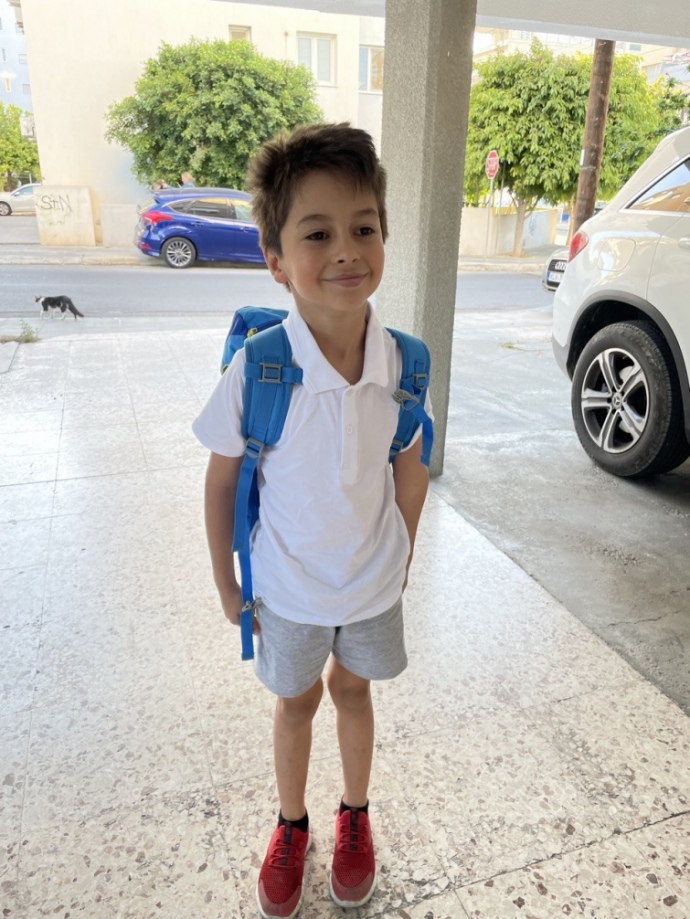
In Cyprus, Mykhailo was with his mother, sister and his best friend, who had moved there earlier.
"I had problems at school because I didn't understand what was being said at all. I studied like that for about a month. Kiriusha and I would get up early, do exercises, and his dad would take us to school. His dad was on a business trip to Cyprus when it all started.
We did not communicate with anyone because we did not know the language. Then we met a Russian. At first, we thought he was Ukrainian, so we decided to do a ‘palianytsia’ test on him. We asked him, ‘Do you know what a palyanytsia is?’ He replied that it was some kind of doughnut. In the end, he himself told the teacher that he was from Russia," the boy recalls. [‘Palianytsia’, a type of bread, is a Ukrainian word that Russians find difficult to pronounce properly. Since the full-scale Russian invasion Ukrainians started to use the word as means to identify Russian military or saboteurs – ed.]
In Cyprus, Mykhailo acted in a play, attended two independence parades, swam in the sea, but missed home.
"I wanted to return to Kyiv, but I was still scared. I was scared of the missiles. In Chortkiv, I was most scared of missiles for some reason.
I was also very scared when they fell on Ternopil [a city near Chortkiv]," Mykhailo recalls.
After returning to Ukraine, Mykhailo moved to Chortkiv, and then his mother moved the children to Chernivtsi.
"Fear of war turned into fear of zombies, criminals, ghosts"
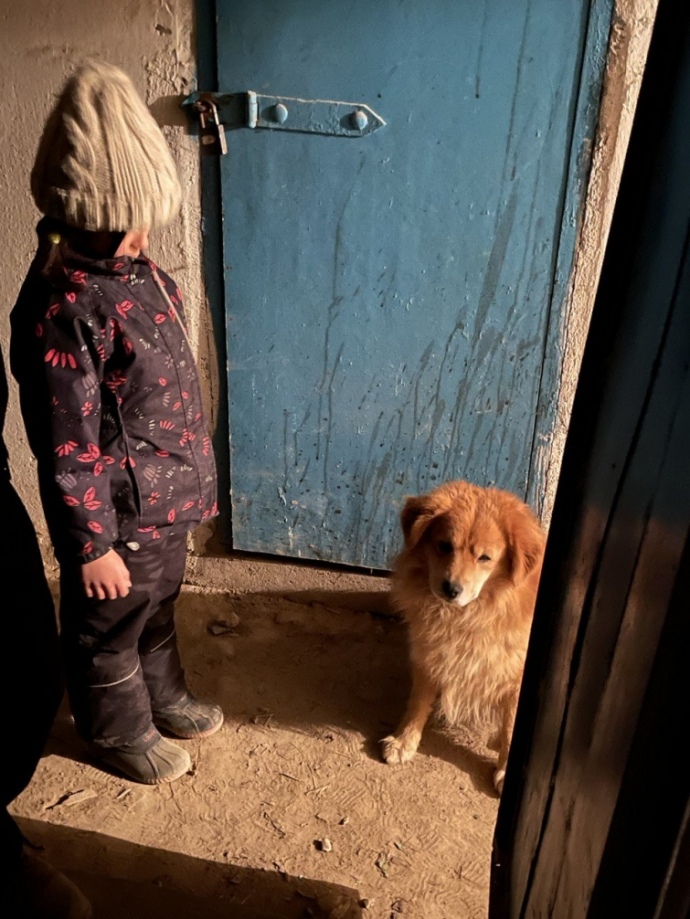
Mykhailo believes that he was calmer before the war.
"When I stopped being afraid of missiles, the fear of war turned into fear of zombies, criminals, ghosts. I became a little more nervous.
One night, an ordinary backpack seemed like a sorcerer to me. To overcome this, I would read a book at night, and sometimes I would look at my phone too much to calm down, which I don't recommend.
I also improved my social skills a bit, and I became better at communicating with people. I've become much more immersed in the history of Ukraine," Mykhailo reflects.
When the power was cut off for the first time, Mykhailo did not understand what was happening, especially when this followed several successive air raids. But now blackouts don't scare him as much.
"I would like to see what victory looks like. I imagine something like the Independence Day Parade. That's the closest thing I associate victory with, other celebrations seem smaller," the boy reflects.
After the victory, Mykhailo plans to return to Kyiv. He also dreams of travelling in time, writing a book and opening a cafe.
Olena Barsukova, Ukrainska Pravda.Zhyttia
Collage: Andrii Kalistratenko, Ukrayinska Pravda
Translation: Oxana Hart
Editing: Susan McDonald